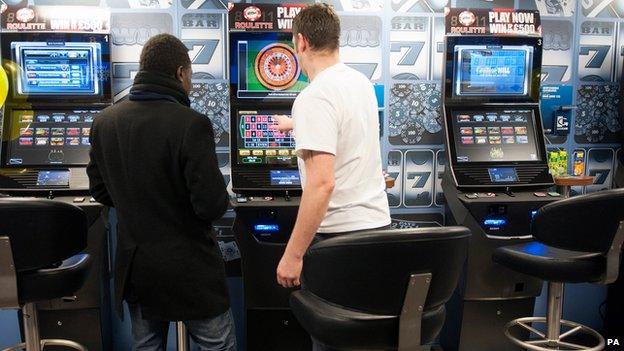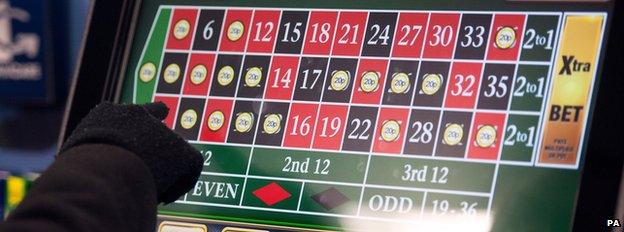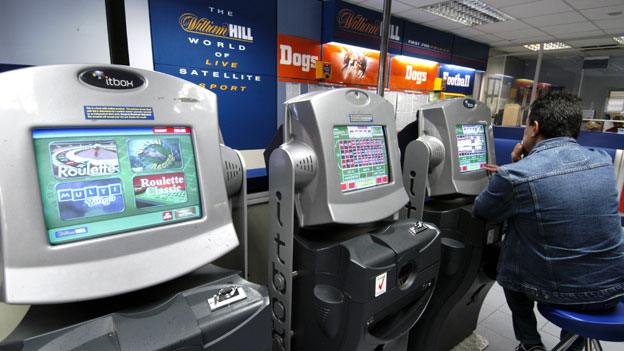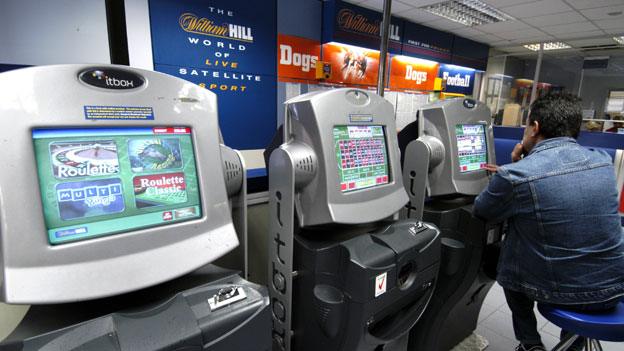£2 betting machine limit rejected by government
- Published

The government said it had already introduced stricter controls
A bid to have the maximum bet on some gambling machines significantly reduced has been rejected by the government.
Some 93 councils in England and Wales called for the highest stake on fixed-odds betting terminals (FOBTs) to be cut from £100 to £2.
Newham Council, which led the campaign, said the move would help prevent clusters of betting shops, particularly in deprived areas.
The government said it had already introduced stronger controls.
The proposal had been submitted under legislation which allows councils to urge central government to change the law to help them promote the "sustainability of local communities".
Newham's mayor, Sir Robin Wales, said the decision was an "insult" to councils.
"We will challenge this decision, because without a reduction in stakes, FOBTs will continue to blight the nation's high streets," he said.
Problem gambling
There has been a significant rise in the amount of money gambled using FOBTs in recent years.
Between October 2013 and September 2014, £1.6bn was lost by gamblers using the machines, up from £1.3bn in 2010-11, according to the Gambling Commission.
Newham Council has said it is possible to bet up to £18,000 in an hour using them.
Earlier this year, new rules were introduced which mean anyone wanting to place a stake over £50 on the machines has to interact with staff or set up an account with a bookmaker.
The government said the change will allow staff to monitor behaviour and act if they identify signs of problem gambling.

Case study: 'I spent any money I could'

Simon Perfitt, 59, spent ten years using fixed-odds betting terminals. During that period he lost his job and home after gambling "any money" he had.
Mr Perfitt, who lives in Dudley, was 47 before he even entered a betting shop. But within two years of being introduced to gambling machines by a friend, he was addicted.
"When [FOBTs] first came out, you saw quite a few people winning", he says, explaining the attraction of the machines. "That and the fact that there were fixed odds."
Mr Perfitt never bet as much as £100 in a single stake, but often splurged £30 on each bet. He recalls losing £3,000 in a single lunch hour. After losing his job, he would often spend a whole day gambling.
"It probably wouldn't have been so attractive if there were lower stakes," Mr Perfitt says, though he concedes he may have just ended up losing his money "more slowly".
He doesn't know exactly how much money he lost over his decade of gambling, but estimates around £180,000.
Mr Perfitt eventually ended up in rehab for a year. He hasn't gambled for more than three years and now works for the charity, Rethink Gambling.

A government spokesman said: "We do not support Newham Council's proposal as we have already acted by introducing stronger gambling controls to further protect players and promote responsible gambling, in April.
"This includes putting an end to unsupervised stakes above £50 on FOBTs and giving more powers to local authorities to stop new betting shops opening up in their areas.
"The government will continue to monitor the effectiveness of existing controls and will take further action if necessary."
'Responsible measures'
Sir Robin said betting shops had "taken over our high streets".
"Current planning and gambling laws are failing to protect our towns and high streets," he added.
The Campaign for Fairer Gambling, which supports a lower maximum stake, said: "Councils are the ones who know the impact of FOBTs in their areas."
Labour's shadow sports minister, Clive Efford, said more research was needed on high-stake FOBTs, but added local councils needed more power to act.
A spokesman for the Association of British Bookmakers said the industry was committed to "responsible gambling measures".
Any rule changes should be "based on facts and evidence", he added.
Some powers over gaming machines with a maximum stake of £10 or more in Scotland are expected to be devolved to Holyrood as part of the Scotland Bill.
- Published8 January 2014

- Published18 June 2013
